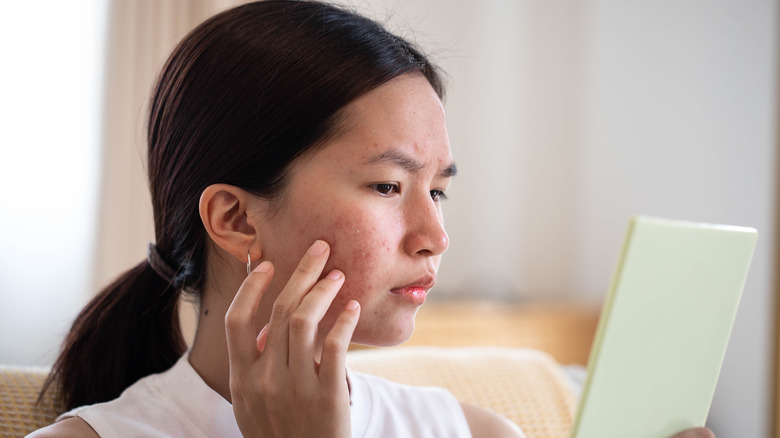What Happens To Your Body When You Stop Eating Fried Food
According to Carver College of Medicine, up to 40% of Americans consume fried foods daily, which is not a good thing. Making these foods a regular part of your diet can increase your risk of a number of dangerous conditions, including heart disease, obesity, and cancer. In addition, these foods can contain a toxic substance known as acrylamide, which, according to a 2015 study published in the International Journal of Cancer, may be linked to kidney, endometrial, and ovarian cancer.
Although these foods are undeniably tasty (and there's nothing wrong with the occasional splurge), it's wise to reduce your intake considerably or drop them from your diet altogether. A 2009 study conducted by Mount Sinai showed that cutting back on fried foods can reduce inflammation and restore the body's natural disease-fighting abilities. The study noted that fried foods are high in toxins known as Advanced Glycation End products, or AGEs, which adhere to the body's tissues and cause inflammation. So, with this information, it stands to reason that setting aside the fried stuff at dinner will do your body good. Here's what happens when you opt for a non-fried diet.
Your weight will go down
Fried foods are high in calories, being coated in batter and flour and cooked in fatty oils. These oils are absorbed into the foods that are being cooked, raising their fat and cholesterol content, as well as their calorie count. As an example, according to the Joint Chiropractic, a baked potato has 90 calories and zero fat. If you were to take that same potato, dice it up in to slices and deep fry them as french fries, the calorie count would spike to 320, and the fat content would go up to 17 grams.
Losing weight requires you to consume fewer calories than you burn, according to WebMD. A deficit of about 500 calories per day, achieved by healthy eating and a solid exercise regimen, should put you on track to lose a pound a week on average. Because of this, cutting out high-calorie fried foods is a fast and easy way to create a deficit and shed those unwanted pounds. Be aware that everyone's caloric needs are different, and you should consult with your doctor before settling on a diet and exercise routine that work for you.
Your heart will thank you
High in saturated fats and trans fats, fried foods can wreak havoc on your heart health. These fats raise the levels of cholesterol in your blood and form artery-clogging plaque, which, over time, can lead to a wide range of heart conditions. Most seriously, this plaque buildup can block the flow of blood to the heart, leading to a heart attack.
A 2021 study published in the journal Heart outlined the cardiovascular risks associated with fried food consumption, showing that eating these foods increases a person's risk of major cardiovascular events, including heart attack, stroke, and heart disease. The study revealed that people who consumed the most fried food in their diet had a 28% greater risk of experiencing a major cardiovascular event and a 37% higher chance of heart failure.
However, if you simply can't say no to a fried treat, you may want to consider the oil you're using. A 2012 study published in The BMJ shows that foods fried in olive or sunflower oils show no association with heart problems or death from cardiovascular issues.
Inflammation will improve
In addition to the weight and heart problems that can be caused by eating foods like doughnuts, mozzarella sticks, and jalapeno poppers, you can also trigger an inflammatory response in your body. According to Healthline, the high heat that comes from deep frying raises the level of AGES in food. A 2021 study published in Nutrients showed that AGEs in food are often not digested, lingering in the colon where they can stimulate inflammation.
When you suffer from inflammation, you can experience a wide array of symptoms, including excessive mucus production, aches and pains, dry skin, and acne. If you suffer from chronic inflammation, the body continues to overproduce white blood cells, leading to such serious conditions as heart disease, diabetes, and arthritis. Taking fried food off the table will help to reduce or even eliminate the presence of AGEs in your system, which should prove to be a difference-maker in keeping inflammation at bay.
Your risk of disease will drop
In addition to heart problems, making fried food a regular part of your diet increases your risk of developing a wide range of life-threatening diseases, as evidenced by a 2019 study published in the British Medical Journal. According to that study, women who consumed just one serving of fried chicken per day could increase their risk of death by 13%. Those who enjoyed one serving of fried fish or shellfish saw their risk of death increase by 7%.
Additionally, fried food can contain unhealthy ingredients and carcinogens that could lead to cancer. A 2018 review published in Frontiers in Nutrition showed that acrylamide, a compound commonly found in fried foods, proved to be carcinogenic in rats, indicating its potential danger to humans as well. A 2020 study published in Molecules revealed the damaging effects of acrylamide, including apoptotic cell death. Lastly, a 2018 study published in the International Journal of Molecular Science shows that this cell death allows cancer cells to thrive, giving them more of a window to mutate further and for tumors to progress.
Your brain may become sharper
Fried food is not only bad for your heart; it can also be bad for your brain. The inflammation that comes from eating these foods can impact the blood vessels to your brain and have an effect on your thinking skills (via WebMD). In fact, a 2016 study published in Clinical Nutrition showed that a diet high in processed and fried foods could be linked to brain inflammation and a sharp downturn in reasoning skills over a 10-year period.
Additionally, a 2023 study that ran in the Proceedings of the National Academy of Sciences showed that a diet high in fried food was linked to increased anxiety and depression. The study found that people who consumed even a serving of fried food every day had a 12% higher risk of anxiety and a 7% higher risk of depression than those who abstained. Much of the link between fried food and anxiety can be traced back to the presence of acrylamide, which causes inflammation in the brain and weakens the blood-brain barrier.
Your bones get stronger
High-sodium foods are bad for your bones because the excess salt in these foods depletes your calcium levels. A 2016 study published in the Asia Pacific Journal of Clinical Nutrition revealed that Chinese men who made salty foods a staple of their diet were more prone to developing osteoporosis. Similarly, a 2017 study in Osteoporosis International found the same results in post-menopausal women. In older people who suffer from arthritis, the AGEs found in fried food can also be harmful, due to the inflammation that they can cause (via Healthline).
Additionally, according to Ozark Orthopaedics, the hydrogenated oils that are often present in fried foods, as well as other packaged snacks, deplete your body of vitamin K, which is essential for good bone health. On top of that, the Save Institute reports that frying foods in high-temperature oil can cause the development of peroxides. These peroxides can cause problems with your liver, preventing it from removing harmful, bone-damaging toxins from your bloodstream.
You'll have more energy
Packed with fat and light on fiber, fried foods are slow to be digested, which means that it can take a lot longer for any nutrients to enter your system. As a result, rather than feeling energetic after a fried meal, you will most likely feel lethargic (via Healthline). The longer digestion process also means that your body is working harder to digest your food, redirecting energy that could be used elsewhere.
Another culprit in sapping your energy level is a hormone called cholecystokinin. This hormone, produced by the small intestine, triggers contractions in your gallbladder and pancreas, stimulating digestion (via Cleveland Clinic). A 1997 study published in Physiology & Behavior showed that concentrations of cholecystokinin were higher after consuming high-fat meals. In addition, two to three hours after a high-fat meal, subjects in the study tended to feel sleepier and more fatigued versus subjects who ate a low-fat meal.
Your digestion will improve
Fried foods are difficult to digest, ending up in the colon and being broken down into fatty acids, according to Harvard Medical School. When this happens, the colon produces fluid, leading to diarrhea. Additionally, these foods are linked to a number of digestive issues, including inflammation in the bowels and, in more serious cases, colon cancer. A 2019 study published in Cancer Prevention Research showed that foods fried in oil increased tissue inflammation, exacerbated symptoms of colitis, and increased the risk of developing colon cancer.
Eating a diet high in fried food can also be bad for your gut microbiome, as shown by a 2021 study in Diabetes Care. According to that study, people who ate fried meat had far less diverse gut microbes than those who did not. This led to lower insulin levels and higher levels of inflammation in the body. This inflammation is particularly problematic, as it can lead to the formation of small holes along the gut lining, a condition known as "leaky gut."
Your skin will clear up
Your complexion isn't being helped by your consumption of fried food. According to The Dermatology Group, fried and fatty foods are loaded with omega-6 fatty acids. These fatty acids are known for causing inflammation in the skin, which can lead to acne. Trans fats, which are also present in fried foods, are no friend to your skin either, according to Topeka Acne Skin Care. Saturated fats can also lead to pimple-forming inflammation.
The ingredients in these foods, such as saturated fats and carbohydrates, can cause your skin to form oily sebum, as noted by a 2009 study published in Dermatoendocrinology. As evidence, a 2010 study in the Journal of the European Academy of Dermatology and Venereology showed that teenagers and young adults who subsisted on a high-fat diet had a more than 40% chance of developing acne. If those high-fat foods happened to be fried, then the risk went up by 17%.










